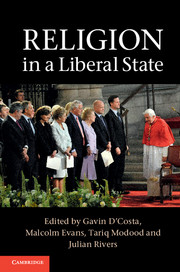Book contents
- Frontmatter
- Contents
- List of contributors
- Acknowledgements
- Introduction
- 1 Religion in a liberal state
- 2 The European Court of Human Rights and religious neutrality
- 3 Religion and sexual orientation: conflict or cohesion?
- 4 Liberal religion and illiberal secularism
- 5 Moderate secularism in liberal societies?
- 6 Excluded, included or foundational?
- 7 Justificatory secularism
- 8 What lacks is feeling: mediating reason and religion today
- 9 Arguing out of bounds: Christian eloquence and the end of Johannine liberalism
- Index
- References
6 - Excluded, included or foundational?
Religions in liberal-democratic states
Published online by Cambridge University Press: 05 June 2014
- Frontmatter
- Contents
- List of contributors
- Acknowledgements
- Introduction
- 1 Religion in a liberal state
- 2 The European Court of Human Rights and religious neutrality
- 3 Religion and sexual orientation: conflict or cohesion?
- 4 Liberal religion and illiberal secularism
- 5 Moderate secularism in liberal societies?
- 6 Excluded, included or foundational?
- 7 Justificatory secularism
- 8 What lacks is feeling: mediating reason and religion today
- 9 Arguing out of bounds: Christian eloquence and the end of Johannine liberalism
- Index
- References
Summary
As we know, the status of religion in public and political life in liberal democracies has been heavily contested for centuries. In recent philosophy and politics, the focus of this debate has been rather narrowly on reasons, arguments and doctrines (i.e. principles, values and norms) or symbolic universes. We can discern three possible positions. First position: religions in this narrow sense should be excluded from public or political debate in political society, from democratic debate or discourse, from elaborating alternatives for democratic decision-making and, particularly, from legislative decision-making, implementation of laws and regulations and from adjudication (different varieties of exclusivist secularism, ethical secularism and foundational secularism). Second position: religions should not be restricted to private life or civil society but should be allowed to play a fair and equal role in public discourse, in civil society and in democratic debates and deliberation on all issues without being allowed a privileged role, let alone a foundational or monopolistic role (different varieties of inclusivist secularism or, in my terminology, public and political religions compatible with priority for liberal-democratic constitutionalism). Third position: religions, or more narrowly one religion, claim a foundational status over competing religions or against non-religious morals, reasons, arguments or doctrines. This is usually combined with ‘cultural’ and ‘political’ but also ‘legal’ and ‘constitutional’ establishment.
In earlier publications (Bader, 1999; 2007a: ch. 3; 2009a) I have dealt extensively with the first two positions and there is no need to repeat the arguments in detail by adding an updated version to this ever-growing body of literature.
- Type
- Chapter
- Information
- Religion in a Liberal State , pp. 135 - 163Publisher: Cambridge University PressPrint publication year: 2013
References
- 1
- Cited by



